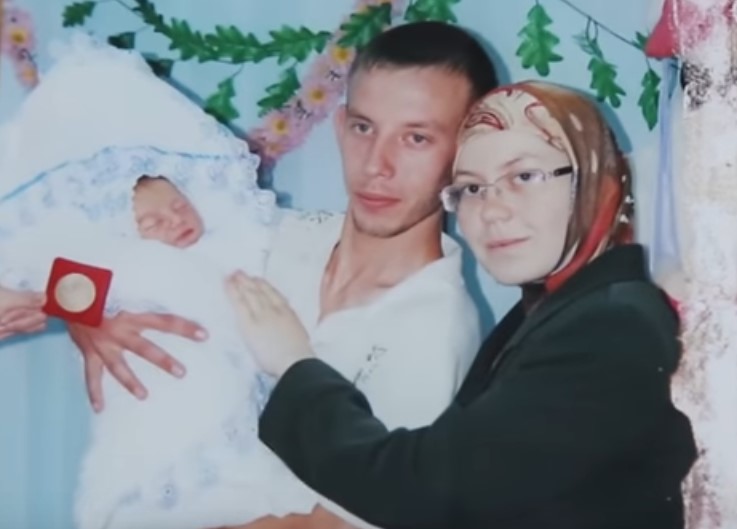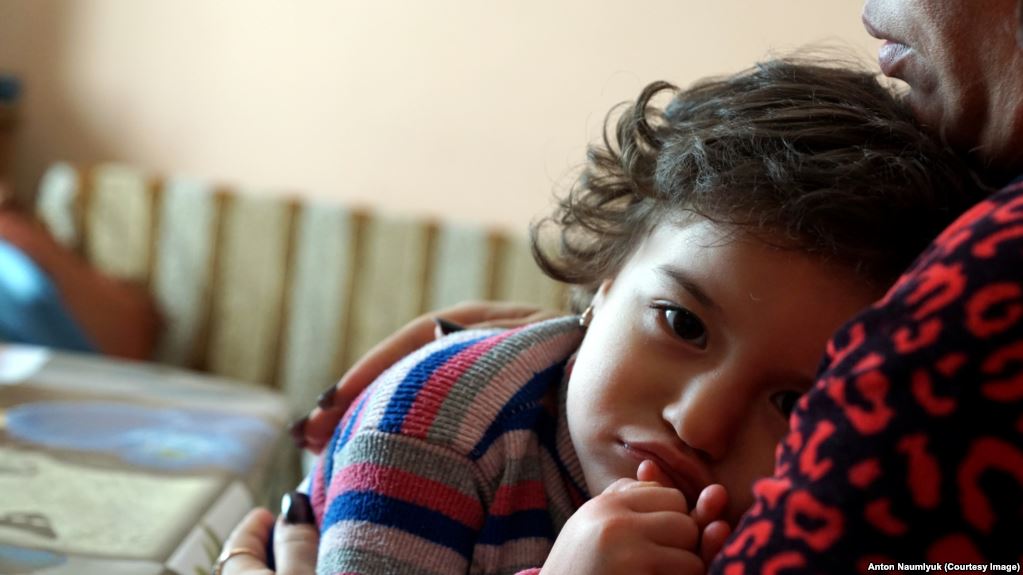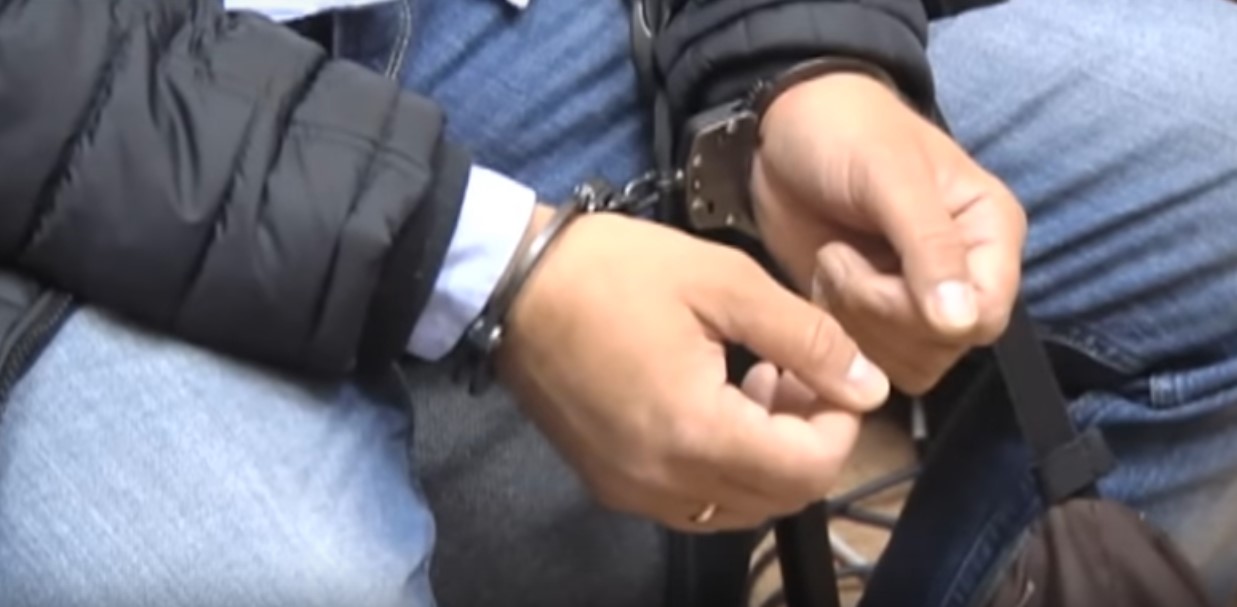Difference between Russia and Ukraine
21 March is the UN International Day for the Elimination of Racial Discrimination. On this very day three years ago, the federal constitutional law on the annexation of Crimea by Russia officially entered into force.
Two weeks ago, the International Court of Justice in The Hague started considering Ukraine’s lawsuit against the Russian Federation. The suit concerns, in particular, the violation of the Convention on the Elimination of All Forms of Racial Discrimination. Based on the reports of international human rights watchdogs, Kyiv accuses Moscow of treating Crimean Tatars and ethnic Ukrainians as enemies of the occupation regime in Crimea and introducing a system of collective punishment on the non-Russian communities.
Read more: Full text of Ukraine's case against Russia in UN court
Six months before the hearing in The Hague, the Crimean Tatar Ruslan Zeytullaev did not need sophisticated legal terminology to explain the dramatic change that befell him and other Crimeans as a result of Russia’s occupation of Crimea in 2014:
“People ask me what is different between Ukraine and Russia. So I answer them that in Ukraine I lived, worked, helped people as much as possible, created a family and tried to provide it with everything needed. But under Russia, less than a year passed before I was jailed. [...] I know one thing for sure: under custody, I’ll not be able to keep caring and bringing up my little children, helping my mother and other dearest people. That’s where I see the difference between these two states.”
Ruslan Zeytullaev is 31. He is a builder, activist, and father of three daughters. The eldest girl is only seven, and they all keenly feel their separation from their father. The Russian investigator threatened Ruslan’s wife Merhem that she could share the fate of her husband and her kids would be sent to an orphanage.
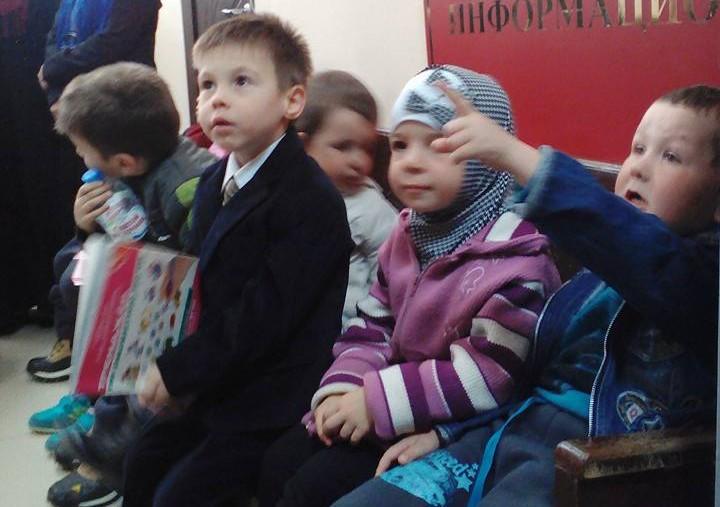
Ruslan has been in remand prison since January 2015. Russia’s Federal Security Service (FSB) declared him an organizer of a cell of the Party of Islamic Liberation (known as Hizb ut-Tahrir), which was tantamount to the charge of “terrorism”—with no evidence of his personal involvement in dangerous activities. In September 2016, a court in the Russian city of Rostov-on-Don adjudged him to seven years in prison, but that was not enough for the prosecution. The Supreme Court of the Russian Federation decided to send his case to the retrial, which may give him a much longer sentence already in April 2017.
Having committed no crime, Ruslan risks remaining in jail for 15 or 17 years, perhaps even more.
Creating “grounds” for repression
Why did Russia deprive Ruslan of freedom and family? Because he, like many other Crimean Muslims, did not fit the Procrustean bed set by the newly arrived FSB officers from Russia and local collaborators, including the law enforcers who betrayed their oath to Ukraine.
After the annexation of the peninsula, Russia planned to influence the local Muslim believers through the Spiritual Directorate of the Muslims of Crimea (SDMC). The Directorate is a religious NGO established in 1995, which in 2014 turned into a de facto ideological department of the occupation administration. The SDMC members became notorious after their absurd statements: for instance, its deputy chair Ayder Ismailov recently blamed Ukraine for contributing to the alleged rise of “extremism” among the Crimean Tatars—an accusation that is not grounded in reality.
However, Ismailov makes no mention of the Russian judges who banned the Mejlis, the Crimean Tatar democratic representative body, in 2016. He also ignores the Russian investigators, prosecutors, police and security officers who persecute recognized leaders, veterans and activists of the Crimean Tatar national movement after the peninsula’s occupation, and that the occupation authorities make no efforts to investigate the kidnappings and murders of Crimean Tatars. Neither does he name the Kremlin-appointed officials who banned the annual public commemoration of 1944 Stalin's deportation of the entire Crimean Tatar people.
Read also: Russia bans Crimean Tatars by banning the Mejlis
Everyone who disagreed with the SDMC on religious or political issues became potential targets for the groundless accusations of “terrorism” and “extremism.” Under new Article 205.5 of the Russian Criminal Code (in force since the end of 2013), proving the involvement in harmful acts or preparation to them is not necessary to persecute any person for “terrorism”. The only thing needed is ascribing the participation in the forbidden organization to a defendant.
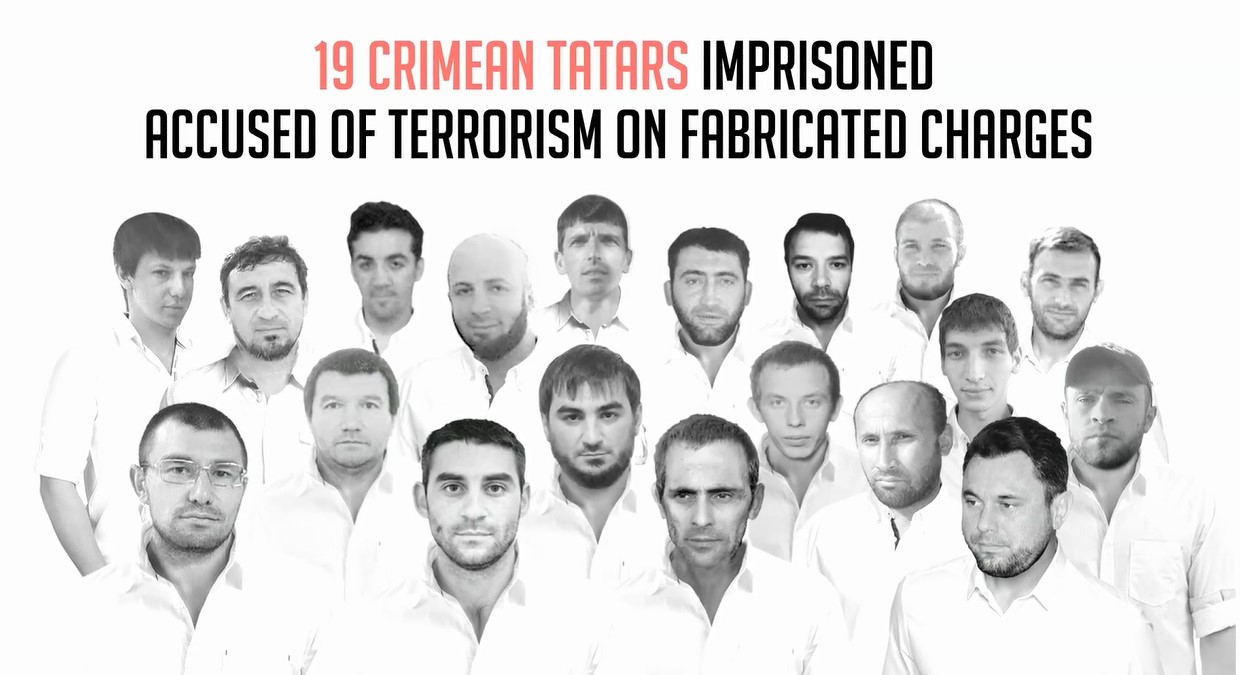
Watch: Why is the Kremlin taking Ukrainian political hostages? | VIDEO
“Terrorist organization” without terrorism
In 2003, the Russian Supreme Court, without a single proof, declared “terrorist” and banned the international Party of Islamic Liberation (known as Hizb ut-Tahrir). Ever since that judgment, the prosecution of people allegedly linked to this organization has been going on in Russian regions. Article 205.5 was reportedly used against them for the first time in Russia’s republic of Bashkortostan in late February 2014—the very days when Russian troops invaded Crimea. In April 2014, Bashkortostan FSB boss, General Viktor Palagin, known for “mopping up extremists” in the region, was appointed the first chief of the new Crimean FSB branch. He carried the priorities of his previous work to the occupied peninsula.
Over the sixty years since the establishment of Hizb ut-Tahrir, members of its numerous subdivisions were never convicted for any act qualified as terrorist. The organization has been legal in Ukraine and the vast majority of other countries in the world.
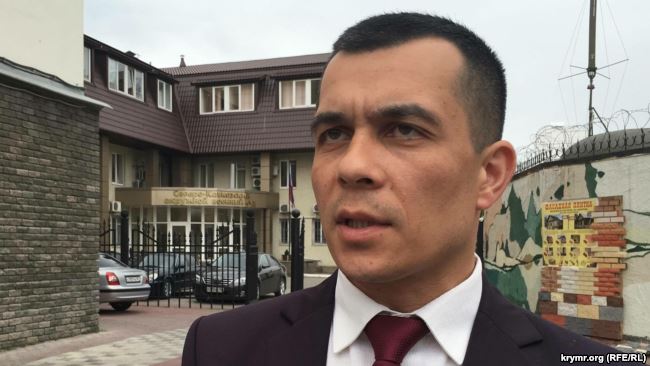
“If someone perceives Crimean Tatars’ way of life as strange and incomprehensible, if someone is alarmed and frightened that for more than 1,500 years, Muslims gather once a week in a mosque, and that even a construction worker discusses the condition of his people and Muslims of the world with compatriots and fellow believers, using words that someone doesn’t understand, [...] it doesn’t mean that the defendants are terrorists and criminals,”
Emil Kurbedinov, who serves as the lawyer of Ruslan Zeytullaev, said during the trial in Rostov-on-Don.
How exactly do the Russian investigators prove that a certain person “belonged” to a “terrorist organization”? The ridiculous arguments could merit a laugh if they hadn’t already led to tragic consequences. The “proof” is religious literature found during the searches, as well as kitchen talks about politics, religion, and the media, recorded by an FSB provocateur. In other words, the Crimean Muslims are accused of exercising in private their rights to freedom of speech, conscience, and belief guaranteed by the Russian Constitution.
Surprisingly, one witness in Zeytullaev’s case has admitted in March 2017 that his detailed testimony against the defendant was based solely on hearsay: “Well, someone said somewhere but they showed no documents and did not say anybody that they were Hizb ut-Tahrir.”
Perhaps in the same way, one could “prove” that prisoners belonged to any other community: from the Ukrainian nationalist party “Right Sector” to Putin’s ruling party “United Russia” to a Masonic lodge. Ironically, the investigation in the cases of Crimean Muslims had been under the special control of then “prosecutor of Crimea” Natalia Poklonskaya, who became notorious for her literally idolatrous attitude to the last Russian Tsar Nicholas II. Recently, she made herself the butt of jokes claiming that the Tsar’s bust installed next to the occupation “Prosecutor’s Office” in Simferopol miraculously wept “holy tears.”
Perpetrator blames victim
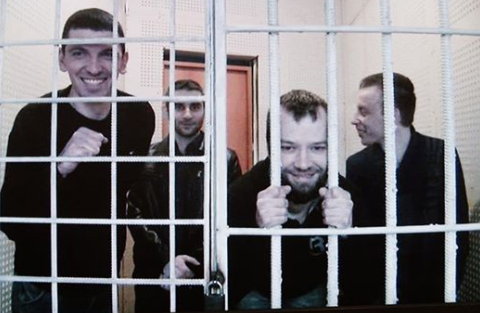
At some point, the detectives seem to have realized that such kind of absurd evidence as kitchen talks was not convincing even to the Russian judges dependent on the executive authority. This became especially evident during the trial of Zeytullaev and three other defendants from Sevastopol: Nuri Primov, Ferat Sayfullaev, and Rustem Vaitov. The military court in Rostov-on-Don found them guilty of “belonging” to Hizb ut-Tahrir but adjudged them to much lower sentences than the prosecution demanded (whereas the same court had sentenced another Crimean hostage, the filmmaker Oleg Sentsov, to 20 years in prison).
Zeytullaev, whom the prosecutor wanted to jail for 17 years, was convicted not as an “organizer” but as an ordinary “participant” of a Hizb ut-Tahrir cell. He received seven years in a penal colony, and each of other defendants got five. In other words, according to the verdict, this imaginary cell left without an “organizer” at all, which indicated the poorly disguised collapse of the whole case.
Perhaps the Russian authorities were troubled about the possibility that all other trials of the Crimean Muslims could follow this finale. This meant that despite the guilty verdicts, in five or seven years, the convicts would return home, to their families, friends, and compatriots, hailed as heroic martyrs. Russia would get much stronger, more experienced and determined opponents in Crimea. The solution was to keep them far from Crimea for as long as possible. But how?
And here, head of the Crimean FSB General Palagin plays his trump card, which he already tried during his tenure in Bashkortostan: charging Muslim believers, apart of “terrorism,” with plotting “seizure of power.” The respective Article 278 of the Russian Criminal Code stipulates from twelve to twenty years behind bars.
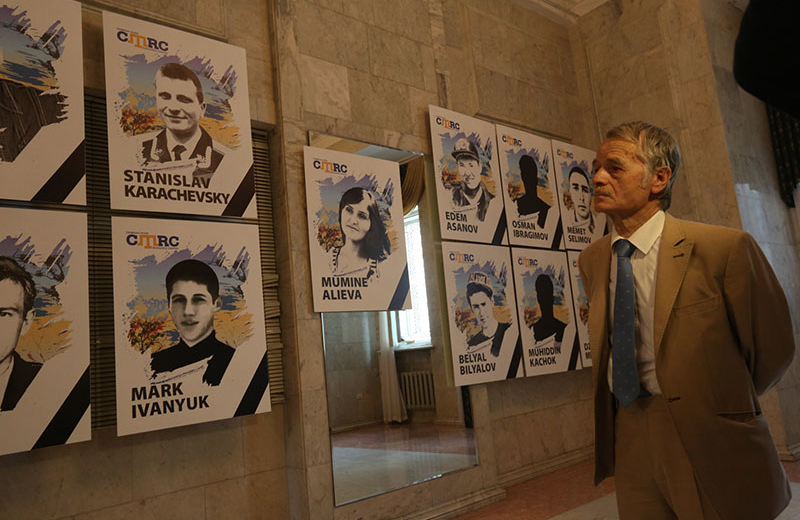
The occupiers of Crimea don’t shy away from blaming their victims for the crimes they are guilty of themselves. It was Russia that, in violation of international law, grabbed the Crimean peninsula, organized the armed seizure of the regional parliament, forced Ukrainian military units to surrender, misappropriated Ukraine’s property and imposed Russian citizenship to Crimean residents without their permission. After all, it is the Kremlin-controlled “head of Crimea” Sergey Aksyonov who calls to abolish the de jure republican regime in Russia and proclaim Putin a lifelong ruler with dictatorial power.
The repression of Crimean Muslims is an integral part of this system of effrontery established by the invaders three years ago. When Ruslan Zeytullaev was put in a Simferopol remand jail, FSB officers explained him without ceremony:
“Since you are here, you are already guilty, and you cannot prove the opposite. Because we are above the law.”
You can make a difference
However, even in such circumstances, Ruslan does not despair because he feels support from Ukraine and other countries. He does not trust Russian judiciary but relies on the power of non-indifferent people. When bringing him letters, guards in Rostov initially wondered whether he had dozens of relatives ready to write him. “It was your top leadership whose illegal actions contributed to the fact that I’ve acquired so many relatives from various countries,” he replied.
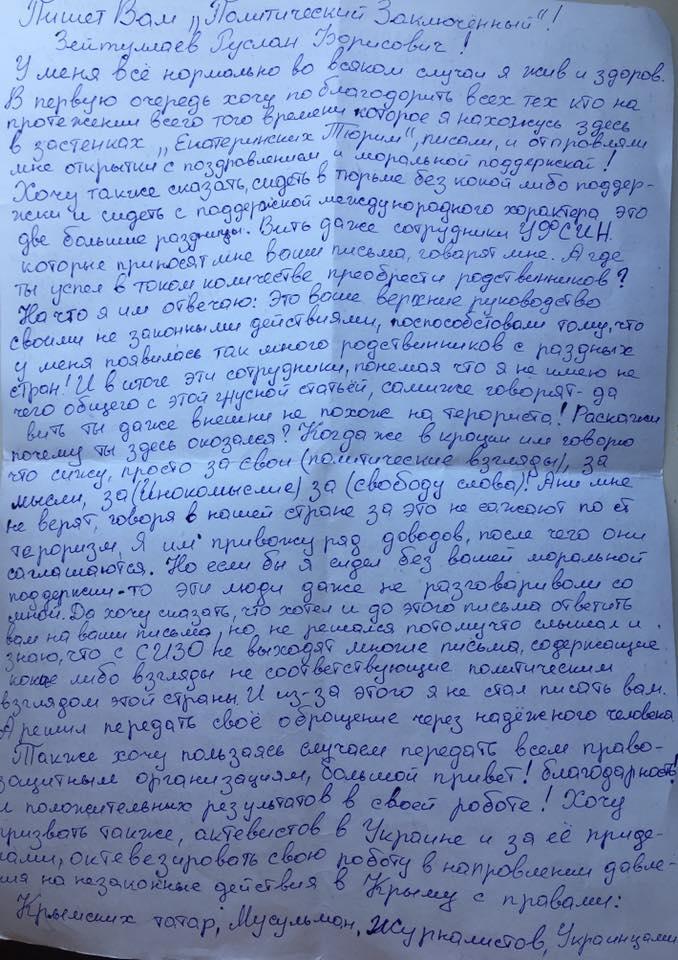
Ruslan has recently sent an open letter of gratitude from a Rostov jail, where he addresses all of us:
“I’d like to call on the activists in Ukraine and abroad to step up their work concerning the pressure in response to the illegal actions against the rights of Crimean Tatars, Muslims, journalists, Ukrainians in Crimea! The desired outcome can be achieved only through the international pressure, and this will not happen immediately: it requires a constant animation around this huge problem. I ask you not to stop halfway, even if your cause may seem difficult or futile. You bet, everything has its own boiling point.”
If this appeal is heard, he believes, one day justice will prevail.
Zeytullaev Ruslan Borisovich (born 1985), remand prison #1, 219 Gorkogo Str., Rostov-na-Donu, 344022, Russia.
Related:
- Like Hitler, Putin told the West in advance what he'd do -- and the West ignored him
- With Crimean Anschluss, Putin blocked Maidan from spreading to Russia, Shiropayev says
- Three years later: Russia's suicide by Crimea
- Soviet-era punishment resurfaces in Crimea: the political abuse of psychiatry
- The Crimean Anschluss at three: 'A jubilee of stupidity and criminality'
- Hitler's Anschluss and Putin's: Similarities and differences
- Chronology of the annexation of Crimea
- Russia's Crimean Tatar captive goes on hunger strike demanding justice
- Five signs of less than universal Russian approbation of Crimean Anschluss
- Ankara bans Turkish ships from entering Russian-occupied Crimea. Again.
- Remember the Crimean Tatars jailed for resisting Russian occupation

